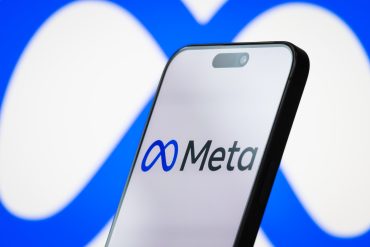
- Regulatory Risk
- Social Platforms
Meta Rejects EU AI Code as Tech Rivals Embrace Framework
6 minute read

Meta’s standalone AI strategy sparks regulatory tensions as tech giant pours billions into proprietary development infrastructure
Key Takeaways
- Meta refuses EU AI Code of Practice while Google, IBM, Microsoft, and OpenAI commit to the voluntary framework designed to promote transparency and safety in AI development
- $14 billion Scale AI investment signals strategy shift as Meta builds massive data centers and pursues vertically integrated AI infrastructure with “hundreds of billions” in planned spending
- Revenue projected to reach $301.8 billion by 2029 as Meta’s AI investments create competitive advantages despite regulatory risks from EU non-compliance
Introduction
Meta stands alone among major tech companies in refusing to sign the European Union’s AI Code of Practice, marking a defiant stance against regulatory frameworks that competitors have embraced. The social media giant’s decision separates it from Google, IBM, Microsoft, and OpenAI, all of which have committed to the voluntary guidelines aimed at promoting transparency and safety in artificial intelligence development.
The move reflects Meta’s broader strategy to maintain independence in AI development while pursuing unprecedented investments in infrastructure and talent. Chief Global Affairs Officer Joel Kaplan criticized the framework as introducing “legal uncertainties” that extend “far beyond the scope of the AI Act.”
Key Developments
The EU’s AI Code of Practice, released in July 2025, establishes voluntary guidelines for companies to comply with the bloc’s Artificial Intelligence Act. The framework requires regular documentation updates, bans training AI on pirated content, and mandates compliance with content owners’ restrictions on data usage.
Meta’s rejection comes as the company pursues an aggressive AI expansion strategy. The company launches Meta Superintelligence Labs while building massive data centers across the United States, including the Prometheus facility expected to be operational in 2026. These investments represent what Meta describes as “hundreds of billions of dollars” in AI infrastructure development.
The regulatory timeline creates pressure points for major AI companies. Rules affecting “general-purpose AI models with systemic risk” require compliance by August 2027, with potential fines reaching seven percent of annual sales for violations.
Market Impact
Meta’s AI strategy drives significant financial performance improvements. Operating margins expanded from 34.66% in 2023 to 42.18% in 2024, while return on equity reaches 38.69% and return on invested capital hits 26.21%.
The company’s R&D intensity exceeds industry norms at 27% of revenue, signaling long-term commitment to AI leadership. Revenue projections show growth from $187.6 billion in 2025 to $301.8 billion by 2029, representing a compound annual growth rate of 12.6%.
Meta’s recent $14 billion investment in Scale AI demonstrates the company’s commitment to creating what executives describe as a “self-perpetuating AI flywheel” that reinforces competitive advantages in both consumer engagement and infrastructure development.
Strategic Insights
Meta’s non-compliance strategy reflects broader industry tensions over AI regulation, according to CNBC. Over 40 major European companies, including Bosch and SAP, have requested delays in AI Act implementation, citing unclear and overlapping regulations that could stifle innovation.
The company’s approach creates distinct competitive positioning. While competitors navigate compliance frameworks, Meta focuses resources on proprietary AI systems and talent acquisition, triggering salary inflation across Silicon Valley as companies compete for skilled professionals.
Meta’s strategy emphasizes consumer AI applications including AR glasses and AI companions to drive future growth. This consumer-focused approach contrasts with competitors’ enterprise-oriented compliance strategies, potentially creating differentiated market positioning.
Expert Opinions and Data
Thomas Regnier, the European Commission’s spokesperson for digital matters, notes that companies not signing the code face increased regulatory scrutiny and must find alternative compliance methods. The Commission maintains that adherence provides legal protection against future AI Act accusations.
Meta representatives defend the company’s position, stating: “We advocate for a responsible approach to AI, focusing on mitigating bias and ensuring fairness, even if we’re not signing the code.” This stance underscores Meta’s strategy to independently manage AI protocols without external frameworks.
Industry analysts characterize Meta’s approach as high-risk, high-reward. The strategy could secure long-term AI dominance if successful, but carries significant regulatory and reputational risks in key global markets.
Political dynamics influence Meta’s calculations. President Trump’s criticism of the AI Act as “a form of taxation” provides potential regulatory relief, though the EU maintains its implementation timeline despite industry pushback.
Conclusion
Meta’s refusal to sign the EU’s AI Code of Practice represents a calculated bet on regulatory independence over compliance-driven approaches adopted by competitors. The company’s massive infrastructure investments and talent acquisition strategy position it for potential long-term advantages while creating immediate regulatory tensions.
The decision highlights fundamental disagreements over AI governance between tech companies and regulators. Meta’s approach prioritizes innovation speed and proprietary development over collaborative regulatory frameworks, setting up a test case for how AI companies navigate conflicting demands for growth and compliance in global markets.








